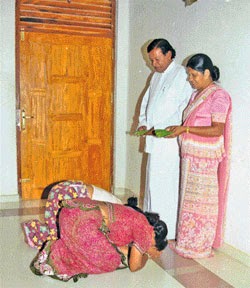While I was in university, I decided to write a research paper on "Buddhist Ceremonies, Rituals and Customary Practices in Sri Lanka." This gave me the chance to research and learn more about a wide range of cultural events that I had been a part of as a child while growing up in my native country. It also demonstrated the critical role they had played on a social level, to intermingle with Buddhist practices to form a populist form of Sinhalese Buddhism, which exists today. Although critics may argue that this version of Buddhism is a deviation of the theoretical Buddhism, I came to the conclusion that this fusion has been vital in ensuring Buddhism's survival in the country.
April marks the dawn of Spring - the beautiful season in most countries. According to the Buddhist calendar, it is known as Bak, or in other words, the Blessed month. Historically, when the Sinhala society was largely agriculturally based, this month coincided with the Harvest Festival or the Aluth Sahal Mangallaya. It was their way of thanking the unseen for the abundant harvest that they had received. The new year, also known as the Soorya Mangallaya was an extension to this festival and first originated as a worship of the sun god. One may argue that these events hold no significance in this modern day and age that is dominated by a knowledge based economy and technology based lifestyle. However, in my opinion the rituals associated with this festival are still relevant because of the many values that they inculcate especially to the younger generation.
 |
| Avurudhu: A Symbol of Family Cohesiveness |
On this day, almost all of the major activities are begun only according to an astrologically specified auspicious time. The time in between the sun’s journey from the Pisces to the Aries, called the ‘nonagatha’ is deemed inauspicious by astrologers, and consider it inappropriate to engage in any regular activity, including farming, cooking, or anything that involves fire and water. So, it is customary that most people take their last meal for the ‘old year’ before this time, and avoid any food or drinks during this interval, which typically lasts for about seven to eight hours. Instead this period, also known as the punya kaalaya is usually spent in a temple or participating in other meritorious deeds. Other major activities consist of boiling a pot of milk, allowing it to spill over (considered as a sign of prosperity); lighting the hearth and commencement of the first meal, (which is traditionally ‘milk rice’), and commencement of work (a professional activity) at the auspicious time. Other than milk rice, one could also find a wide range of other meals such as sweet meats - kawum and kokis, been the most famous. The first meal of the new year is usually taken together by every member in the family, and because this auspicious moment falls at the same time for every family who celebrate the new year in the country, it is also seen as an occasion that demonstrates national unity.
 |
| Courtesy: Daily News |
 |
| Courtesy: Sunday Observer |
As a kid, I fell in love with the beautiful experience of these rituals and I am still deeply connected to them, because it brings me immense joy and peace to be a part of these meaningful rituals.
Finally, for all those who decide to skip celebrating New Year to have a vacation in Nuweraeliya or another country, I am not going to criticize you. However, please remember that, one day when you are old and alone, and your children do not take the time to visit you with their kids for new year, do not be sorry or regret, because this is what you taught your children and they are simply following in your footsteps...
I wish you all a Very Happy New Year ahead where all your Resolutions and Wishes come true!!!
No comments:
Post a Comment